LAMMPS WWW Site
LAMMPS Workshop and Symposium
August 1-3, 2017
The fifth LAMMPS Workshop and Symposium was held in Albuquerque, NM,
at the University of New Mexico (UNM) Continuing Education Building
(1634 University Blvd NE, map).
We thank the DOE/NNSA ASC program for financial support in hosting the
workshop. We also thank industrial partners
JSOL, Materials Design,
Inc., and
Scienomics for graciously providing
lunches, snacks, and drinks for the attendees. Here is more info on
the LAMMPS-related tools these sponsors create and
provide.
All the PDFs we receive for talks, posters, tutorials, and breakout
sessions will be posted below, for viewing or download.
Video of the main session talks should be accessible on-line in the
next few weeks. We will post the link here when it's available.
Here is the list of workshop attendees.
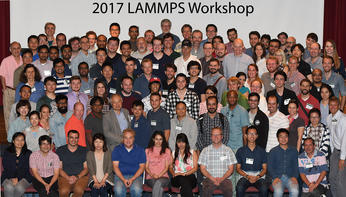 Click for a larger, downloadable version (4.5 MB)
Click for a larger, downloadable version (4.5 MB)
The workshop program included a keynote speaker and 6 invited talks:
- Keynote speaker: George Karniadakis (Brown University)
- The DPD Alphabet for Mesoscopic Modeling
- Mike Chandross (Sandia National Labs)
- Understanding the Mechanisms of Metallic Friction from Atomistic
Simulations
- Amalie Frischknecht (Sandia National Labs)
- Molecular Dynamics Simulations of Ion-Containing
Polymers, PDF
- Nir Goldman (Lawrence Livermore National Lab)
- LAMMPS Driven Quantum Simulations of Prebiotic Chemistry in Impacting
Icy Materials, PDF
- Tim Mattox (Engility Corporation)
- Highly-Scalable Discrete-Particle Simulations with Novel
Coarse-Graining: Accessing the Microscale,
PDF
- Danny Perez (Los Alamos National Lab)
- Long-timescale Simulations with Accelerated Molecular Dynamics and
the EXAALT package
- Ale Strachan (Purdue University)
- Use of molecular dynamics to uncover the operation of electrochemical
nanodevices, design materials for shock energy absorption and metallic
metamaterials with ultra-low stiffness,
PDF
Program
Tuesday August 1, 2017
Tuesday AM: Two tutorials
LAMMPS Beginner tutorial: 8:30 AM to 12 noon
Organized by Matt Lane and Aidan Thompson (Sandia)
8:30 Welcome and agenda, Matt Lane (Sandia),
PDF
8:35 General LAMMPS overview, Aidan Thompson, Sandia,
PDF
8:50 Download, build, and run LAMMPS, Matt Lane (Sandia),
PDF, PDF
handout
9:10 Basic output post-processing, Aidan Thompson (Sandia),
PDF
9:25 Visualization of results, Mitch Wood (Sandia),
PDF
9:40 Break
9:50 Quick tour of LAMMPS, Steve Plimpton (Sandia),
PDF
10:45 Hands-on activity with simple examples that come with LAMMPS,
Aidan Thompson (Sandia), PDF
11:30 Unstructured one-on-one exploration (until noon)
GitHub tutorial: 9:30 AM to 12 noon
Organized by Richard Berger (Temple U) and Anders Hafreager (U Oslo)
9:30 LAMMPS GitHub Introduction / Continuous Integration, Richard
Berger, PDF
10:00 Git Introduction, Anders Hafreager,
PDF
10:45 GitHub Hands-on (until noon), Anders Hafreager & Richard
Berger
12 noon to 1 PM: Lunch in lobby (pizza, salad, soft drinks)
1 PM - 5:30 PM General session of technical talks
Session chair: Amalie Frischknecht (Sandia)
- 1:00 Steve Plimpton, Sandia
- Welcome and what's new in LAMMPS,
PDF
- 1:30 (keynote) George Karniadakis (Brown University)
- The DPD Alphabet for Mesoscopic Modeling
- 2:15 Giacomo Fiorin, Temple University
- Enhanced sampling simulations with the Colvars
module
- 2:30 Jason Koski, Sandia National Laboratories
- Effect of an electric field on capillary waves
- 2:45 Javier Rojas, Universidad de Santiago de Chile
- Structure and energy properties of Fe(x)-Cu(1-x) nanoparticles:
Morphology and size effects, PDF
- 3:00 Dan Bolintineanu, Sandia National Laboratories
- Recent developments and applications of LAMMPS capabilities for
simulations of granular media,
PDF
3:15 PM break
- 3:30 Alexander Moore, Sandia National Laboratories
- Understanding the Plastic Response of Tantalum in Quasi-Isentropic
Compression using Atomistic Simulations
- 3:45 Ray Shan, Materials Design, Inc
- Mechanical Properties of Glassy Polymer Blends and Thermosets from
Atomistic Simulations, PDF
- 4:00 Pieter in 't Veld (BASF)
- Soft Matter simulations and workflows at BASF
- 4:15 Drew Rohskopf, Georgia Institute of Technology
- Phonon Optimized Potentials
- 4:30 Julien Tranchida, Sandia National Laboratories
- Parallel implementation of spin and spin-lattice simulations in
LAMMPS, PDF
- 4:45 Jacob Gissinger, University of Colorado Boulder
- Modeling Chemical Reactions in Classical Molecular Dynamics
Simulations, PDF
- 5:00 (invited) Nir Goldman (Lawrence Livermore National Lab)
- LAMMPS Driven Quantum Simulations of Prebiotic Chemistry in Impacting
Icy Materials, PDF
Tuesday dinner: No-host dinner at County Line
Barbeque, 9600
Tramway Blvd NE, and optional tram-ride to top of Sandia
Crest, meet up for rides in lobby at 5:30
PM. Dinner cost of ~$30, tram cost of ~$25.
Wednesday August 2, 2017
8:30 AM - 12 noon General session of technical talks
Session chair: Mark Stevens (Sandia)
- 8:30 (invited) Amalie Frischknecht (Sandia National Labs)
- Molecular Dynamics Simulations of Ion-Containing
Polymers, PDF
- 9:00 Brandon Peters, Sandia National Laboratories
- Dynamics in entangled polyethylene melts using coarse-grained
models
- 9:15 Lucas Hale, National Institute of Standards and Technology
- Interatomic Potentials Repository: interatomic potentials, property
calculation scripts, and related resources,
PDF
- 9:30 Ellad Tadmor, University of Minnesota
- The OpenKIM testing framework for interatomic
potentials, PDF
- 9:45 Ryan Elliott, University of Minnesota
- A Brief User's Guide and Developer's Introduction to
OpenKIM, PDF
- 10:00 Nikhil Chandra Admal, University of California Los Angeles
- MDStressLab - Computing stress in atomistic
simulations, PDF
10:15 PM break
- 10:30 Robert Elder, U.S. Army Research Laboratory
- Simulation studies of shock wave propagation and reflection in
semi-crystalline polyethylene
- 10:45 Aidan Thompson, Sandia National Laboratories
- Large-Scale Reactive Simulations of Shocked Energetic
Materials, PDF
- 11:00 (invited) Tim Mattox (Engility Corporation)
- Highly-Scalable">PDF Discrete-Particle Simulations with Novel
Coarse-Graining: Accessing the
Microscale
- 11:30 Richard Berger, Temple University
- Using Python in LAMMPS, PDF
- 11:45 Anders Hafreager, University of Oslo
- Atomify - increased productivity with live
visualization, PDF
12 noon to 1 PM: Box lunches (lobby)
1 PM - 5:30 PM Breakout sessions
8 one-hour breakouts (two per hour in parallel)
1:00-1:15: one-minute breakout advertisements
Materials track: all in side ballroom
1:15-2:15 Solid-state: chaired by Ray Shan
(Materials Design, Inc.), PDF
- 1:15 Potentials for solid state materials
- Discussion and Q&A
- 1:30 Felipe Valencia, University of Chile
- Confinement effects in irradiation of nanocrystalline
diamond
- 1:45 Tahereh Majdi, McMaster University
- Leveraging epitaxy to control thermal transport
- 2:00 Obtaining properties for solid state materials
- Discussion and Q&A
2:15-3:15 Soft matter: chaired by Mark
Stevens (Sandia), PDF
- 2:30 Qiang Wang, Colorado State University
- Systematic and Simulation-Free Coarse Graining of Polymer
Melts, PPT slideshow file
- 2:45 Minghao Liu, Arizona State University
- A united atom model for polyurea elastomers
3:15 PM break
3:30-4:30 Coarse graining: chaired by Dan
Bolintineanu (Sandia), PDF
- 3:45 Svetoslav Nikolov, Georgia Institute of Technology
- Modeling non-linear micromechanics of hydrogels using dissipative
particle dynamics
4:30-5:30 Interfaces (solid/liquid):
chaired by Jeff Greathouse (Sandia), PDF
- 4:45 Rafael I Gonzalez, Universidad Mayor
- Simulation of Aluminosilicate Nanotubes (Imogolite) Immersed in
Water
- 5:00 Douglas Franz, University of South Florida
- Simulations of Gas Sorption in rht-MOF-9,
PDF
Software track: all in main auditorium
1:15-2:15 Simulation setup via EMC:
chaired by Pieter in't Veld (BASF), PDF
This is a hands-on tutorial for building complex initial structures
using EMC. If possible, participants should download and install EMC
(https://montecarlo.sourceforge.net)
and LAMMPS on their laptop beforehand, in order to maximize time
devoted to working with EMC.
- Introduction
- Installation (see comment above)
- Treatment of provided examples
- Treatment of user-supplied examples
2:15-3:15 Visualization (Ovito, VMD): chaired by Mitch Wood
(Sandia), PDF
3:15 PM break
3:30-4:30 Performance via accelerator packages: chaired by Stan
Moore (Sandia), PDF, PDF2
4:30-5:30 Developers brainstorm: chaired by Steve Plimpton (Sandia),
PDF
- 4:45 Christoph Junghans, Los Alamos National Laboratory
- LAMMPS on CMake, PDF
Wednesday dinner: No-host dinner at Los
Cuates, 4901 Lomas Blvd, meet up for
rides in lobby at 5:30 PM. Dinner cost of ~$20.
Thursday August 3, 2017
8:30 AM - 12:30 PM General session of technical talks and posters
Session chair: Aidan Thompson (Sandia)
- 8:30 (invited) Ale Strachan (Purdue University)
Use of molecular dynamics to uncover the operation of electrochemical
nanodevices, design materials for shock energy absorption and metallic
metamaterials with ultra-low stiffness,
PDF
- 9:00 Shawn Coleman, U.S. Army Research Laboratory
- HCP Grain Boundary Motion Via Artificial Driving Force
Methods
- 9:15 Remi Dingreville, Sandia National Laboratories
- A primer on selecting grain boundary sets for comparison of
interfacial fracture properties in molecular dynamics
simulations, PDF
- 9:30 Mitchell Wood, Sandia National Laboratories
- Linear Scaling, Quantum-Accurate Interatomic Potentials with SNAP;
Reaching those Hard-to-Reach Places in Classical Molecular
Dynamics
- 9:45 Christian Negre, Los Alamos National Laboratory
- LAMMPS and the LATTE density functional tight-binding
code, PDF
- 10:00 (invited) Danny Perez (Los Alamos National Laboratory)
- Long-timescale Simulations with Accelerated Molecular Dynamics and
the EXAALT package
10:30 AM one-minute poster advertisements
10:45 AM to 11:45 AM Poster session (lobby)
- Nathaniel Blevins, Arkansas State University
- Molecular Dynamic Simulations: Estimating Engineering & Thermodynamic
Properties of Asphaltene & Resin
- Jonathan Bollinger, Sandia National Laboratories, CINT
- Microscopic simulations show allosteric compaction in microtubules
drives catastrophe
- Jordan Campbell, University of California, San Diego
- Diffusion Studies of Structurally Amorphous Metal Foils Using
Molecular Dynamics Simulation
- Kenta Chaki, JSOL Corporation
- Dissipative particle dynamics simulations for dispersion of polymer
grafted nanoparticles
- Jennifer Clark, Sandia National Laboratories
- Modeling the Impact of Sulfonate Concentration on Proton Diffusion in
Hydrated SDAPP
- Rachel Flanagan, University of California, San Diego
- Non-equilibrium simulations of shock-induced horizontal defects and
amorphization in 4H silicon carbide
- Eric Hahn, Los Alamos National Laboratory
- Towards Predicting a Microstructure's Susceptibility to Spall:
Non-equilibrium Molecular Dynamics Simulations of
Tantalum, PDF
- Keith Jones, Sandia National Laboratories
- Molecular dynamics study of shock compression in porous silica
glass
- Zhen Li, Brown University
- Mesoscopic Modeling, Concurrent Coupling and Multiscale
Framework, PDF
- Aria Mansouri Tehrani, University of Houston
- Effect of Point Defects on the Phase Transformation of NiTi Shape
Memory Alloy, PDF
- Ygor Morais Jaques, University of Campinas
- Nanodroplets Behavior on Functionalized
Nanopores, PDF
- Ingrid Marcela Padilla Espinosa, North Carolina A&T State University
- Molecular dynamics simulations of Calcium Silicate Hydrates under
hydrostatic compression
- Felipe Perez, University of Oklahoma
- Methane and carbon dioxide adsorption in kerogen models using
molecular simulations, PDF
- Cristiano Woellner, University of Campinas / Rice University
- Molecular Dynamics Investigation of energy absorption of crystalline
3D porous carbon-based structures
- Mohammad Reza Zamani Kouhpanji, University of New Mexico
- Molecular dynamic simulations of Lithium Cobalt Oxide cathode
materials, PDF
- 11:45 (invited) Mike Chandross (Sandia National Labs)
- Understanding the Mechanisms of Metallic Friction from Atomistic
Simulations
12:15 Workshop feedback, group photo - led by Aidan Thompson (Sandia)
Thursday 12:30 PM to 1:30 PM: Box lunches (lobby)
Thursday PM
Recreational actitivies
We held nice group dinners on Tuesday and Wednesday at the County Line
BBQ and Los Quates.


After dinner on Tues, we went on a tram-ride up to the top of Sandia
Crest (10500 ft).
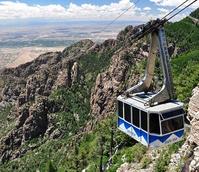
After the workshop ended, we had two Thursday afternoon activities.
Hiking the Tree Spring Trail in the Sandia Mountains
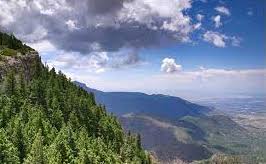

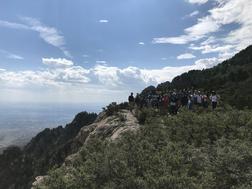 Click for larger, downloadable versions of last two
Click for larger, downloadable versions of last two
For those who enjoy a pleasant hike, we will be walking up the Tree
Spring Trail, which is on the cooler, shadier east side of the Sandia
Mountains, 30-40 minutes from Albuquerque by car. We recommend
everyone car pool as much as possible for the drive up and back. From
the trailhead, the trail climbs approximately 1000 feet in 2 miles to
a point on the ridgeline of the Sandia mountains. After exploring and
admiring the views from the ridge, we'll return via the same
route. This hike is 'moderate' in difficulty and the pace will be
leisurely. The total walking distance (there and back) is
approximately 4 miles. The trail starts at 8500 feet above sea level,
going up to 9500 feet. The reduced fugacity of O2 will be somewhat
noticeable, but that will be more than compensated for by the cooler
temperatures. We don't know exactly how long the hike will last, but
a rough guess is three to four hours, including the drive.
Visit to the Old Town section of ABQ, which included the Rattlesnake
Musuem and some local history going back 300+ years.
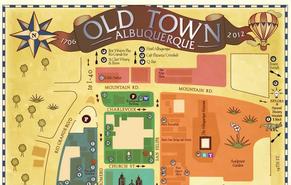
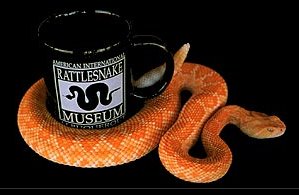
Coporate sponsors
Here is more info on the companies who helped sponsor the workshop,
their LAMMPS-related products, and contact info for who will be at the
workshop. Two of the companies will also have display tables in the
lobby during the conference.
JSOL Corporation
The JSOL Corporation has released the latest version of J-OCTA, v3.1,
in July 2017. In v3.1, various new features and enhancements, such as
new force field definitions and a force field optimizing
functionality, have been added. The usability of the interface has
been remarkably improved, an interface access to the job management
system has been added, and the platform has been enhanced. Please try
and explore the powerful and user-friendly J-OCTA v3.1 at our JSOL
booth at the LAMMPS Workshop and Symposium 2017.
More details are available here.
Contact:
Dr. Taku Ozawa, Ph.D.
taku.ozawa at jsol.co.jp
Material Sciences Team
Engineering Technology Division
JSOL Corporation
Materials Design, Inc.
Materials Design is the leading atomistic simulation software and
services company for materials. We help users across many diverse
disciplines improve existing materials, design new materials, predict
their properties, and generate value through innovation. MedeA-LAMMPS
fully automates the use of LAMMPS, and unlocks its power for both
experimental and theoretical groups seeking to increase their
productivity. MedeA combines LAMMPS with a sophisticated GUI,
databases, structure builders, and computation modules for tackling
complex structures and labor-intensive property extractions. In
addition, MedeA’s unique integration of ab initio and forcefield
methods enables users to model each step during the research life
cycle and allows them to understand the mechanism of physical
processes. High-throughput and high-fidelity modeling enabled by MedeA
provides guidance to screen large numbers of design options for
materials before committing to experiments saving resources, and
maximizing your productivity. Check out http://materialsdesign.com for
more details.
Stop by the Materials Design table and say hello to Dr. Ray Shan
(rshan at materialsdesign.com) and Dr. Naida Lacevic (nlacevic at
materialsdesign.com), who will be happy to answer any questions you
may have on our products.
Scienomics
Contact: Lalitha Subramanian (lalitha at scienomics.com)









